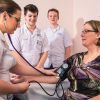
Laura Beaumont
- Course: Healthcare Science (Cardiac Physiology) BSc
I enjoy the vibrant city and social aspects of studying at Leeds, there is always lots going on and lots of interesting things to see and do.
I always knew I wanted to work within a healthcare environment and took part in numerous work experiences in order to determine which career path I wanted to take. On my first day of work experience within a cardiology department, shadowing cardiac physiologists, I knew this was a career I wanted to pursue. I enjoy performing and reporting diagnostic tests, as a contribution towards providing appropriate, patient-centered care. I believe this is because I enjoy problem solving and working within a multi-disciplinary team, of people with a wide variety of knowledge and skills.
Teaching quality within the programme is good – the main lecturers, who deliver the majority of the cardiology-based programme, are cardiac physiologists themselves with years of experience and in-depth, specialist knowledge. Other modules are then taught by other healthcare staff, who are themselves experts within their chosen field, meaning that teaching is generally of high quality and any questions can be answered.
Support is available from lecturers during lectures themselves, usually, pre or post lectures or any time you are able to arrange support or guidance. This can be over the phone, via e-mail, or face-to-face. As the cohorts tend to be small for our modules, relationships with members of staff develop very quickly and support, advice and guidance is easy to seek and find. I have always felt well-supported at university, by all members of staff.
I have enjoyed most of the modules on the degree programme, however my favourite modules are always the clinical practice modules, as these enable consolidation of theoretical learning and practical experience, to develop clinical skills, required for a career as a cardiac physiologist.
As well as exams, we are assessed on essays, presentations, practical assessments in clinical placement, and on our final year research project. This variety of assessment methods means that we are not assessed in just a single format, and students can excel in areas in which they are more able.
Clinical placement starts quite early on in year one and, although this feels daunting at the time, this is brilliant in getting you used to being in a clinical environment. As you are not expected to know a lot of theory in your first few weeks of placement, this gives you time to settle in, get to know people and observe the clinical skills you will, one day, learn and perform yourself. Throughout the degree, clinical placement hours enable the practice of theoretical learning and an alternative learning style and environment to university-based learning. This definitely increases your knowledge-base and experience, contributing towards increased confidence and making placement an enjoyable form of learning, within the clinical setting you will soon work in.
In my first year, my clinical placement was at Dewsbury Hospital. Although it is quite a small department I enjoyed this for my first year as I was well-supported and was able to practice my clinical skills and develop and expand my knowledge. I also got to observe a variety of tests, beyond my first year scope of practice, which further increased my passion and drive to pursue this career path. During the summer between first and second year I then gained employment at Barnsley Hospital, and so I have completed the remainder of my placement time at Barnsley, working full-time, alongside my degree. Barnsley is a bigger department and, despite not being a tertiary centre, there is a large variety of cardiology services and good relations between staff at Barnsley and other neighbouring hospitals. Consequently, I have further developed my clinical skills and knowledge and had a wonderful support network throughout my degree. I have felt part of the team from day one, and wouldn’t have wanted to complete my degree any other way.
Facilities across the campus are modern, up-to-date and accessible. I have used the libraries on many occasions for both independent and group study, as group rooms can be booked online. There are also clinical rooms, used for the practice or demonstration of clinical skills or diagnostic tests, which are invaluable for learning.
There are lots of social events to take part in at university. Social events can be organised with your own cohort, students from other courses and societies. As there are a wide variety of different people with different interests and hobbies there are always events to attend or people to see. I’m part of the society for cardiac physiology – we arrange social events when we’re able to.
I have been employed since shortly after finishing first year. Through employment I have developed numerous, strong relationships with members of staff who have helped me throughout my degree, in terms of support, advice and guidance. Working whilst at university can be difficult at times, however both the department staff and university staff are understanding of the struggles associated with both full-time work and full-time study. I believe that this experience of being employed at my placement hospital has massively supported and enhanced my learning and experience, as I have completed in excess of the required number of placement hours, required for the degree programme. I have also learnt and developed skills not required for the degree but required for working within my department. Being part of a team, being relied upon, and contributing towards the hard-work and success of your department brings a wonderful sense of belonging, which has made my university experience a unique and thoroughly enjoyable.
Read more about some of our other recent cardiac physiology students.

